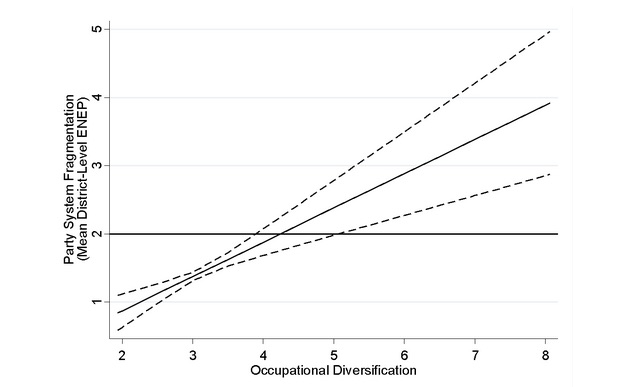The nature of contemporary politics means that first-past-the-post is unable to prevent multiparty systems
Duverger’s law states that a first-past-the-post electoral system – such as the one in use in the UK for Westminster elections – will support and sustain two party politics. But in recent years, the UK has seen what is essentially a multi-party system emerge, despite systemic constraints. Christopher Raymond looks at how this has come to pass, and suggests that electoral reform may result from the political fragmentation.
![Credit: Mosieur J. [version 9.1]](https://www.democraticaudit.com/wp-content/uploads/2015/09/138978422_34d0f4738c_z.jpg)
Multicolour politics? (Credit: Mosieur J. [version 9.1])
One immediate challenge to this literature is the fact that most countries using first-past-the-post rules have more than two parties. To account for the fact that many of these parties receive a relative handful of votes, and therefore should not be treated as equivalent to those parties that actually stand a chance of forming the government, scholars have devised measures to account for this (the most frequently used measure being the effective number of parties). Using such measures, many studies have found that—compared to electoral systems designed to promote parliamentary representation that is proportional to parties’ vote shares—the (effective) number of parties is significantly lower in first-past-the-post systems when viewed not only at the national level, but also at the constituency level (where two-party expectations are most likely to hold).
However, other research has noted that even the effective number of parties may exceed two-party predictions in first-past-the-post systems. Despite the demise of the Liberals at mid-century (and again in 2015), Britain’s two-and-a-half party system has in fact reflected multiparty competition. Accompanied by other studies showing that the number of parties exceeds two-party predictions in other first-past-the-post systems, this evidence challenges the conventional wisdom regarding the ability of electoral institutions to constrain the development of multiparty competition.
In an article recently published in Research & Politics, I examined whether electoral institutions—specifically, the first-past-the-post system—are capable of preventing the formation of multiparty systems when changes in the social structure of society put pressure on the formation of third parties. Examining the party systems of several early-democratising West European polities from the nineteenth to the early twentieth century, I tested whether multiparty systems would have formed at the constituency level under the first-past-the-post rules that many countries employed prior to the adoption of proportional representation (or not, as in the case of Britain). These elections were particularly interesting examples with which to test this argument, as the emergence on the class cleavage put pressure on the existing conservative and liberal parties and offered electoral potential to social democratic parties representing the expanding working classes.
Using a measure of the class cleavage known as occupational diversification (the average of the percentage of the country employed in non-agricultural occupations and the percentage living in urban areas), I tested whether the development of the class cleavage over time produced multiparty systems (defined as an effective number of parties significantly greater than two) in the average constituency. As seen in Figure 1, which presents the predicted values of the effective number of parties across the range of occupational diversification, I found that multiparty systems would have formed in the average constituency even if countries had not adopted proportional representation. This finding suggests electoral rules may not be able to constrain the formation of new parties—even at the constituency level—when changes in the social structure of society put pressure on the party system that would support the development of new parties.
Figure 1: Predicted Party System Fragmentation across the Range of Occupational Diversification
What lessons does this episode have for contemporary British party politics? For one, these results suggest that electoral institutions may not be able to prevent the formation of new parties representing new issues resulting from changes in society that put pressure on the existing parties. This can be seen in the emergence of challengers to the existing order on both the right and left by the successful gains made by UKIP and the Greens in the 2015 election. While we have long known that first-past-the-post systems may increase, not decrease, the chances that parties representing regional interests—like the SNP—will win representation, this finding demonstrates that the number of parties may exceed two-party predictions at the constituency level when societal pressures are felt to at least some degree in constituencies nationwide.
Moreover, these results suggest that the impact of these social changes may be long-lasting. In the case of Western Europe at the turn of the twentieth century, the emergence of the class cleavage produced socialist parties that became permanent features of the party system (and, in many cases, these countries’ largest parties). Like with the parties representing the working classes at the start of the twentieth century, the social changes underpinning support for UKIP and the Greens may have similar longevity, suggesting these parties are here to stay for the foreseeable future. If true, this would mean that elections are likely to be fragmented to the same degree as they were in 2015, which in turn could make the unpredictability of future governments under a first-past-the-post system a permanent feature of British elections.
It is even possible these levels of fragmentation will put pressure on governments to adopt proportional representation—in much the same way as it did to democracies on the continent at the turn of the twentieth century.
—
This post represents the views of the authors and not those of Democratic Audit UK or the LSE. Please read our comments policy before posting.
—
 Christopher D. Raymond is Lecturer in Politics at Queen’s University Belfast.
Christopher D. Raymond is Lecturer in Politics at Queen’s University Belfast.






 Democratic Audit's core funding is provided by the Joseph Rowntree Charitable Trust. Additional funding is provided by the London School of Economics.
Democratic Audit's core funding is provided by the Joseph Rowntree Charitable Trust. Additional funding is provided by the London School of Economics.
[…] Election rules. Election Data. Uk Postal Votes. Uk election fraud. UK Election 2015 Voting. Miscellaneous. The nature of contemporary politics means that first-past-the-post is unable to prevent multiparty s…. […]
What happened in the UK? FPTP and multiparty. Interesting article.
Democratic Audit UK https://t.co/iz3btvt2Wd
Surely there is another aspect to this, relating to the degree to which the voter thinks that the degree of choice between the two main parties matters and counts – they, after all, are the basis upon which all this research is undertaken! Long standing voters, with partisan history behind them, often have a deep rooted view of the two main parties in the UK system as very very different – to an almost tribal degree and to a degree which makes it vital that you retreat into your usual choice, even if you are dissatisfied. “We can’t afford to let the Tories/Labour in” was the driver which killed diverse politics and the temptation to vote UKIP/Green or anyone else.
Not any more, or not so much. Because there is a perception that the two main parties are very similar in the UK, it is now easy to vote for another different choice. Voters also do not seem to think it all matters so much and now know so much less about politics and politicians (other than if they are performing on Dancing with Pins in your Eyes or in Celebrity Big Brother). So on that basis, even within a two-party system, people will increasingly vote for others – the moreso as some elections in the UK of course do NOT run on the FPTP system. So voters can see UKIP winning most UK Europarl seats and then read about it, often indeed written in sensationalist tones. It softens them up to vote for a diverse choice in other elections.
The nature of contemporary politics means that first-past-the-post can no longer prevent multiparty systems https://t.co/kn2oEa5ERV
The nature of contemporary politics means that first-past-the-post is unable … – Democratic Audit UK https://t.co/6ajh5NK8Wz
The nature of contemporary politics means that first-past-the-post is unable to prevent multiparty systems https://t.co/V16hJ4Oauw @iapem
The nature of contemporary politics means that FPTP is unable to prevent multiparty systems https://t.co/agLgUVLZAs
The nature of contemporary politics means that first-past-the-post is unable to prevent multiparty systems https://t.co/r9x0CN8LiX #Option…
The nature of contemporary politics means that first-past-the-post is unable to prevent multiparty systems https://t.co/kn2oEa5ERV
Is Duverger’s law no longer applicable in the UK? Interesting article on @democraticaudit: https://t.co/39FC1HLNUf
The nature of contemporary politics means that first-past-the-post is unable to prevent… https://t.co/FVNyez8O8D https://t.co/wUZL2SXXaE